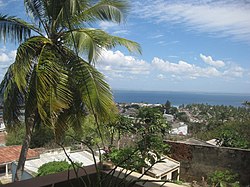Pemba, Mozambique
| Pemba | |
|---|---|
 |
|
| Coordinates: 12°58′S 40°33′E / 12.967°S 40.550°E | |
| Country |
|
| Provinces | Cabo Delgado Province |
| District | Pemba-Metuge District |
| City Status | 1904 |
| Area | |
| • Total | 19.79 km2 (7.64 sq mi) |
| Elevation | 30 m (100 ft) |
| Population (2007) | |
| • Total | 141,316 |
| • Density | 7,100/km2 (18,000/sq mi) |
| Area code(s) | (+258) 272 |
| Climate | Aw |
Pemba is a port city in Mozambique. It is the capital of the province of Cabo Delgado and lies on a peninsula in Pemba Bay.
The town was founded by the Niassa Company in 1904 as Porto Amélia, after the Queen of Portugal, at the peninsula's south western tip and has grown around a port. The city is renowned for its Portuguese colonial architecture. It was renamed Pemba at the end of Portuguese rule, in 1975.
The city's inhabitants are primarily Swahili, Makondes, Macuas and Mwanis. Local languages that are spoken are Kimwani and Macua, although Portuguese is widespread.
In the centre of Pemba, there is an authentic local market or Souk, where arts and crafts, as well as traditional silverware can be bought.
Pemba is also renowned as being a prime destination for water sport and diving enthusiasts as a coral reef lies close to the shore. Pemba has increasingly become a tourist destination, particularly for upper-middle class Mozambicans and South Africans. There is now a weekly flight from Johannesburg to Pemba, a hotel, the Pemba Beach Hotel, restaurants, and other forms of entertainment. Pemba is the closest major city and airport for those who wish to visit Quirimbas Islands and Quirimbas National Park.
...
Wikipedia

